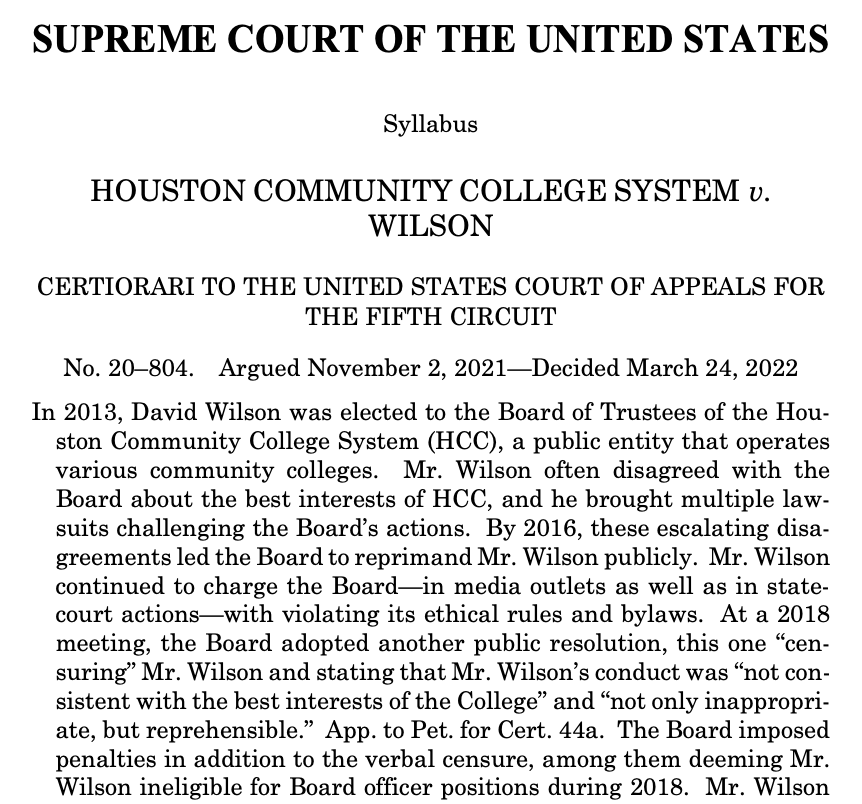What is public censure?

Official reprimand
No one likes to be told that their behavior is out of line. But in this era of political division, public reprimands have become increasingly common. Traditionally reserved for violations of law or ethics, motions for censure have expanded in unprecedented ways, particularly in school boards.
 Explained by
Explained byLeslie Reckler
Education Week, covering the trend, reports that school boards have censured their members “over offensive outbursts or social media speech on hot-button issues such as COVID-19 protocols, teaching about race, and transgender student rights.” The US Supreme Court even stepped in to clarify the law.
This post takes a step back. What’s going on here?
What is censure?
"Censor" means to suppress, hide or delete.
"Censure" means to condemn or to reprimand.
Both derive from the Latin verb censere (to judge).
Censure is an official public act to rebuke of the behavior of a public official. Usually used by legislative bodies, a censure resolution allows a board to formally communicate to the public that the actions of one member are unacceptable to the others. Censure is not censorship, though the words share etymological roots (see box).
Where can I find censure in the law?
You can’t. There is no California law that governs a censure or censure proceedings. However, substantial precedent has established that legislative bodies have the right to pass criticism on members of their own body. The US Supreme Court affirmed this right in the 2022 case Houston Community College System v. Wilson.
How to pass a censure resolution
Censure is serious, and should not be taken lightly. Some school boards have a written policy for censure to set the criteria for bringing about such an action and to define a process for it. Very generally, there are two phases:
- Investigate first. If a board member faces serious allegations of conduct that could violate the law or board policy, the first step is to investigate the facts and determine whether they are credible.
- Then vote. If the investigation substantiates misconduct that may warrant censure, a resolution of censure can outline the alleged offenses and perhaps suggest a remediative course of action.
A school board can place a resolution for censure on the agenda of a school board meeting for discussion/action. A correctly constituted quorum of the board can put the resolution in process for a vote.
A censure resolution should contain specific findings or allegations. An opportunity for public comment should be included, and the board member or representative to be censured must be given a reasonable amount of time to respond to the allegations. All board members may vote on the resolution. Any rebuttals can be included in their entirety in the board’s minutes.
What are reasons for censure?
Anything can serve as a reason for censure. Here are some common reasons and examples of where they were alleged:
|
School District |
Censure |
|---|---|
|
Antioch Unified School District |
|
|
Hayward Unified School District |
|
|
Franklin-McKinley School District |
|
|
Houston Community College |
|
|
Sonoma Valley School District |
|
|
Fairfield-Suisun Unified |
Breaking the Law (Recording without consent) |
|
Ocean View |
What happens after a censure?
All bark, no bite.
Censure resolutions can be time- and resource-intensive efforts that lack meaningful consequences. School boards do not have the power to remove a member from office. They also cannot interfere with a member’s voting rights or curtail other powers inherent to public office. School board members ultimately report to their constituents and not to each other.
School board members report to their constituents, not to each other.
Boards have very limited powers to impose and enforce corrective actions on their elected members. Aside from removing a member from committees and other representations (usually only for a limited period of time), there is little that can be done. Different types of training — governance training, anger management, implicit/explicit bias training — can be suggested, but cannot be enforced.
School boards may submit allegations to regulatory authorities, such as the Fair Political Practices Commission (FPPC), primarily for suspected conflict of interest or election law infractions. Boards can refer cases to the District Attorney for other criminal allegations.
Censure can be expensive
The fallout from a censure action can be extensive. Many censures involve investigations conducted by outside persons, agencies or law firms. The costs can add up quickly.
For example, an investigation of a Sonoma Valley Unified School District trustee cost $92,000. Another investigation of a Fresno trustee was reported to top $114,000. These costs are borne by the school district in the form of dollars and staff time. Whether the investigation is warranted or not, they divert dollars from student achievement.
Censure processes are confrontational, and they can harm both Board and community culture and climate. School communities can become distracted and divided. Some will take the side of the censured trustee, while others might start a recall attempt.
Sometimes trustees file lawsuits, which continue to rack up costs. In 2023, for example, a community college trustee filed suit to overturn his censure. Other times, the censured trustee is left to foot the bill for their defense.
The role of civil grand juries
Sometimes, civil grand juries weigh in. For example, the Kern County Grand Jury found that the Fairfax School District did not abide by the education or government code, the Brown Act (Open Meetings law), or recognized parliamentary procedure when it chose to censure a school board trustee. In a scathing report, the San Joaquin Grand Jury found that the Stockton Unified School District Board of Trustees used censure excessively, and this “use of legal services wastes time and taxpayer money. ” The Grand Jury called for the board members to stop unless “a clear violation of law or policy was demonstrated.”
At times, matters will be referred to a county’s district attorney or the Fair Political Practices Commission, which will investigate.
Time to censor the censure?
In a politicized environment with eroding decorum, it seems likely that the use of censures will increase. In 2022 the US Supreme Court decided in Houston Community College System v. Wilson that it is within a school board’s right to censure a disruptive member, trumping a free speech argument:
“The First Amendment surely promises an elected representative … the right to speak freely on questions of government policy. But just as surely, it cannot be used as a weapon to silence other representatives seeking to do the same.”
— From the Supreme Court decision in Houston Community College System v. Wilson
This right comes at a cost. Joe Mathews, a longtime commentator on California policy and politics, cautions that “many elected officials are being censured by colleagues for doing what elected leaders should do — speak their minds, dissent forcefully, and fight for transparency.”
You decide.
Tags on this post
School boardAll Tags
A-G requirements Absences Accountability Accreditation Achievement gap Administrators After school Algebra API Arts Assessment At-risk students Attendance Beacon links Bilingual education Bonds Brain Brown Act Budgets Bullying Burbank Business Career Carol Dweck Categorical funds Catholic schools Certification CHAMP Change Character Education Chart Charter schools Civics Class size CMOs Collective bargaining College Common core Community schools Contest Continuous Improvement Cost of education Counselors Creativity Crossword CSBA CTA Dashboard Data Dialogue District boundaries Districts Diversity Drawing DREAM Act Dyslexia EACH Early childhood Economic growth EdPrezi EdSource EdTech Education foundations Effort Election English learners Equity ESSA Ethnic studies Ethnic studies Evaluation rubric Expanded Learning Facilities Fake News Federal Federal policy Funding Gifted Graduation rates Grit Health Help Wanted History Home schools Homeless students Homework Hours of opportunity Humanities Independence Day Indignation Infrastructure Initiatives International Jargon Khan Academy Kindergarten LCAP LCFF Leaderboard Leadership Learning Litigation Lobbyists Local control Local funding Local governance Lottery Magnet schools Map Math Media Mental Health Mindfulness Mindset Myth Myths NAEP National comparisons NCLB Nutrition Pandemic Parcel taxes Parent Engagement Parent Leader Guide Parents peanut butter Pedagogy Pensions personalized Philanthropy PISA Planning Policy Politics population Poverty Preschool Prezi Private schools Prize Project-based learning Prop 13 Prop 98 Property taxes PTA Purpose of education puzzle Quality Race Rating Schools Reading Recruiting teachers Reform Religious education Religious schools Research Retaining teachers Rigor School board School choice School Climate School Closures Science Serrano vs Priest Sex Ed Site Map Sleep Social-emotional learning Song Special ed Spending SPSA Standards Strike STRS Student motivation Student voice Success Suicide Summer Superintendent Suspensions Talent Taxes Teacher pay Teacher shortage Teachers Technology Technology in education Template Test scores Tests Time in school Time on task Trump Undocumented Unions Universal education Vaccination Values Vaping Video Volunteering Volunteers Vote Vouchers Winners Year in ReviewSharing is caring!
Password Reset
Search all lesson and blog content here.
Login with Email
We will send your Login Link to your email
address. Click on the link and you will be
logged into Ed100. No more passwords to
remember!















Questions & Comments
To comment or reply, please sign in .